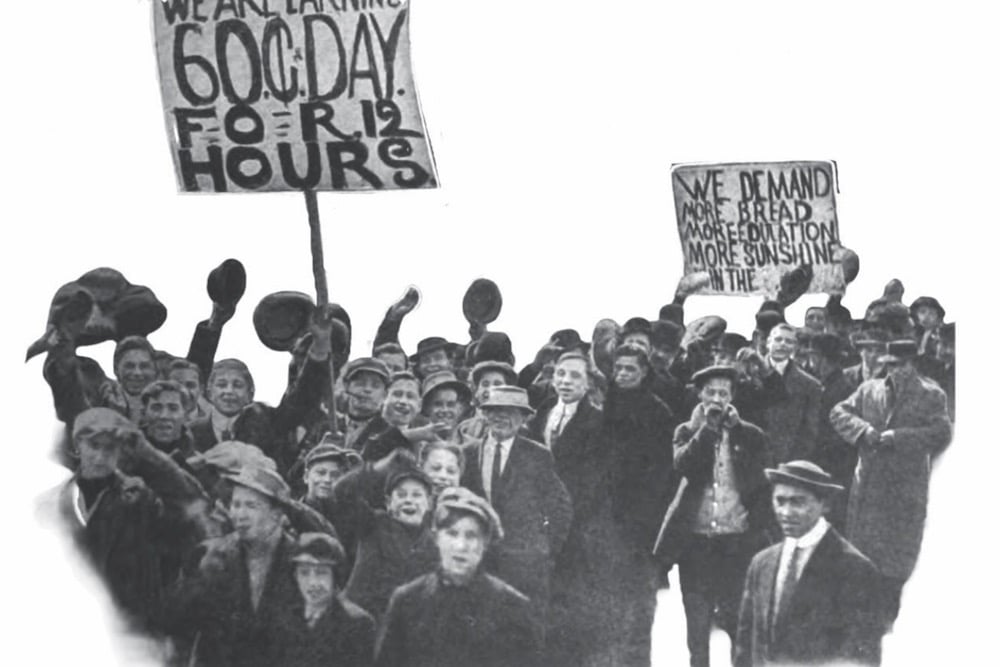She Was the First Woman to Direct a Feature Film — and a Pittsburgher
Pioneering filmmaker and Pittsburgh native Lois Weber has largely been excluded from historical narratives like too many notable women.

FILM DIRECTOR LOIS WEBER AT THE DEMILLE STUDIOS IN CULVER CITY, CALIFORNIA, CA. 1927. | PHOTO COURTESY OF THE BISON ARCHIVES
Sex sells.
How’s that for a history column opener? It’s a cheap, sensational hook, when I should instead allow my writing to stand or collapse on its own strength. There can be no depth beneath such laziness.
Fine. I’ll go deeper and ask a question: Where are the women?
Insanely, this is a controversial question to ask amid the current effort to erase women and people of color from American history. But I ask it sincerely. Open the archives. Dive into the primary sources. Sift through tens of thousands of historical images of life in Pittsburgh since the camera’s advent and see if the question doesn’t tap at your mind. Where are the women?
Due to a highly gendered labor force, the picture that emerges on the surface of Pittsburgh’s past is one in which men pulled every lever of power in politics, culture, commerce and society. And the question emerges again and you can’t shake it — where are the women?
Do not let their relegation to the margins fool you into thinking Pittsburgh was shaped only by men. The women were there. They were scraping out their own destinies until their hands were bloody. Even when their singular identity was reduced to the feminine salutation in front of a man’s name, many pursued their individual happiness. They spent their lives creating art, fighting for progress and becoming more than just the lowercase s in Mrs. Robert Smith.
They are there in Nellie Bly demanding more than a relegation to the society pages, choosing instead to resign from The Pittsburg Dispatch in 1887 with a snarky note she signed not as “Miss Elizabeth Cochran,” but simply, “Bly.”
They are there in Jane Grey Swisshelm, whose push for gender equality and the abolition of slavery situated her squarely in the crosshairs of men. She still launched her own political newspaper in 1847 in Pittsburgh. “This I would do,” she recalled, “and no man had the right or power to stop me.”
They are there in the persistence of environmentalist Rachel Carson, whose crusade to protect nature had men branding her writings as nothing more than emotional outbursts from a “hysterical,” “cat-loving spinster.”
It’s when they bring up your cats that you know you’ve struck a nerve.
And they are there in the seemingly audible messages in the silent films of Lois Weber.
You’re excused if you aren’t familiar with her name. I hope it will henceforth slip from your lips with ease when you talk of Pittsburgh women who, instead of molding themselves to nestle into societal expectations, carved out space for individual fulfillment.
Florence Lois Weber was an Alleghenyite, born to middle-class German immigrants in 1879 on today’s North Side. She was raised in a smoke-clogged city that was shifting from iron to steel and thus shared her timeline with the likes of Carnegie, Frick, Westinghouse and Heinz. She would have been 13 when the Homestead battle occurred. You’ll find her name peppered throughout the arts sections of local newspapers during her teens as a music student, singer and — when family circumstances required she earn a living — a concert pianist by age 16, then a stage actress.
Her move to New York City in her early 20s allowed her to venture into writing and directing film shorts with the Rex Motion Picture Company alongside her husband. By 1912, they were leading the Rex studio in Hollywood — where Weber ran on a suffragist ticket and won election as the first mayor of Universal City. The win, according to the New York Telegraph, gave her bragging rights as the only female mayor in the world at the same time many called her the only female film director in the world.
As a devout Christian, an unshakeable belief system backlit her daring writing and directing choices. At a time when women had no national vote, she used her camera as their collective ballot marker, serving as the voice for progressive reform, social consciousness and female empowerment.
Her use of female nudity via the allegorical Naked Truth in 1914’s “Hypocrites” (filmed on a closed set) led to morality uproars. Those who dared to look beneath the surface, however, found that the Weber written and directed film was not, as some accused, just a cheap grasp at the concept that “sex sells.” The currents that ran deep in her film called attention to religious hypocrisy. The film was a groundbreaking visual masterpiece for the time, with Weber utilizing innovative camera techniques to create special effects. It was wildly successful and cemented her status as a talented filmmaker, leaving Variety to declare, “You can’t forget the name of Lois Weber.”
This spot here, any screenwriter will tell you, is called foreshadowing.
Weber amassed a remarkable portfolio of films she wrote and/or directed between 1914 and 1934 — more than 100, many considered lost and nearly all with themes you simply wouldn’t expect to find bursting from a spinning reel of film in a 1910s theater.
She used her 1916’s “Where Are My Children?” to argue for open access to contraceptives to reduce the number of abortions. The leading characters she created, nearly always female, were not relegated to playacting tropes of domestic bliss and boredom but were instead challenged with complexities like adultery, divorce, domestic violence and romances that crossed class and racial lines. Among her films, artistic commentary can be found on urban poverty, addiction, consumerism, sexual harassment, prejudice and the suffocation of life experienced by women trapped in traditional roles.
The musical girl from Pittsburgh’s North Side became the first woman in America to direct a feature film and the first woman to run her own movie production studio, Lois Weber Productions.
Even as the industry began to change in the 1920s, she did not vacate the space she had carved for herself — drama over spectacle. Authentic story over sanitized trope. Depth over the shallows. She mentored young actresses to tap deeper wells of inspiration and emotion. She championed female inclusion and equality in the industry and purchased rights to stories by women writers (including Pittsburgh’s own Mary Roberts Rinehart).
Weber’s star dimmed to the point she died forgotten on the margins of Hollywood. Why? The easy answer is that she refused to stop using her movies as deep explorations of morality at a time when Hollywood was wading in the shallows. But the more complete answer, historian Shelley Stamp argues, lies in her continued showcasing of feminist issues. Alongside the shift to male power in Hollywood, critics married diatribes against her moral messages with equally strong words lambasting her insistence on writing female emotions into female characters written for female audiences.
What they were really asking: Where are the men?
Lois Weber did not return to the shallows of “sex sells” because she never went there in the first place. Her choices, even those involving nudity, were always made with her heart holding fast to who she was and what she believed. She believed in women.
Hollywood erased Lois Weber despite initially warning us that hers was not a name to be forgotten. We, too, have forgotten her. We’ve forgotten a Pittsburgh woman who never wavered from her individuality or her earnest desire to reveal to women the seemingly absent agency available in their lives.
Pittsburgh was shaped by women, too: Women in the homes, factories and offices; women at the writing desk; women standing up to the powerful; and women fighting for the sick, poor and weak.
Do not forget the women who wrestled the Point away from industry to give us nature. Do not forget those who fought for the vote or for simply “more.” Learn and never let die names like Mary Cardwell Dawson, Daisy Lampkin, Sarah Killikelly and Phoebe Brashear.
And never again erase the name of Lois Weber, who declared amid criticism of her filmmaking choices, “I merely held up the mirror of truth, that humanity might see life.”
In her column, Virginia Montanez digs deep into local history to find the forgotten secrets of Pittsburgh. Sign up for her email newsletter at: breathingspace.substack.com.












